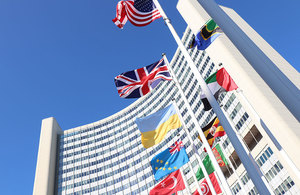UK Statement at Scientific and Technical Sub-committee of the Committee on the Peaceful Uses of Outer Space (COPUOS) on long-term sustainability of outer space activities
Delivered by Andrew Peebles, Senior Political Attaché, UK Mission to the UN in Vienna, 7 February 2022

Thank you for giving me the floor Chair,
The United Kingdom attaches great importance to the Long-Term Sustainability of the Outer Space Environment. Sustainability is just as important in space as it is on earth. To achieve the goal of a sustainable space environment, the UK is playing a leading role alongside UNOOSA in supporting an inclusive approach to capacity building and implementation of the Guidelines for the Long-Term Sustainability of Outer Space. We welcome the progress made during the intersessional meetings of the LTS Working Group and thank Umamaheswaran R. of India, his team and UNOOSA for their able leadership.
Chair,
As COPUOS spent almost a decade negotiating these voluntary guidelines, we believe it is essential to now focus on tangibly implementing them. Implementation and sharing of practices is a key part of uncovering gaps and challenges with the 21 agreed guidelines which will help inform the proposed work of the Working Group. Since 2020, the UK has taken a pro-active approach to sharing our experiences in the implementation of the guidelines; becoming the first country to annually submit a conference room paper to COPUOS on the UK’s national implementation. For this year’s submission, we would encourage all countries to take a look at the CRP which is intended for release later this week.
The UK believes that the template we’ve provided in the CRPs is inclusive, as it could be used by COPUOS Members to contribute their experiences in implementation and/or capacity building requirements into the LTS working group.
Chair,
To support the implementation of guidelines C.1 and C.2 on international cooperation, the UK was pleased to have established our first project with UNOOSA in 2021, which supported awareness-raising and capacity building in relation to the LTS guidelines. Phase 1 of the project led to concrete outcomes, namely the publishing of an accessible version of the LTS guidelines in all 6 official UN languages. Three expert events with industry, regulators and space agencies also led to the production of almost 45 implementation case studies. For more information on these, see spacesustainability.unoosa.org.
Chair,
We also hope that phase 2 of the project will be equally useful in supporting the Long-Term Sustainability of Outer Space.
For Phase 2, UNOOSA will conduct over 40 interviews with Member States of COPUOS, to identify challenges associated with implementation. For the benefit of all stakeholders, UNOOSA will also produce anonymised report of its findings. Member States might be asking themselves ‘why the UK is interested in challenges?’. From the UK’s perspective, understanding ‘what is stopping countries from being able to implement the guidelines’ is critical to understanding the form of future capacity-building activities. In this regard, we invite all Member States of COPUOS to be interviewed by UNOOSA in the coming month, so that we can learn from one another and identify opportunities for collaboration.
Thank you Chair.